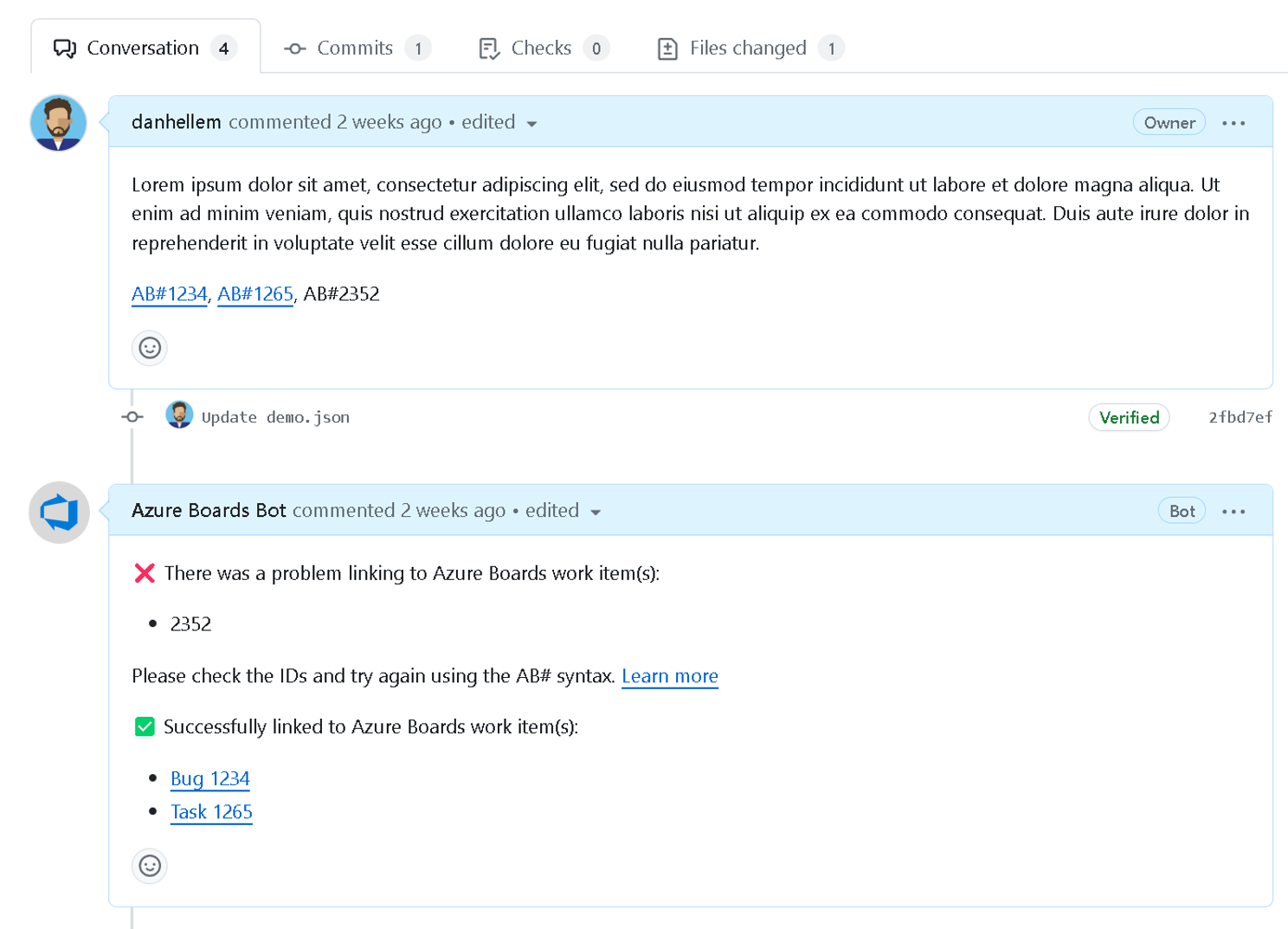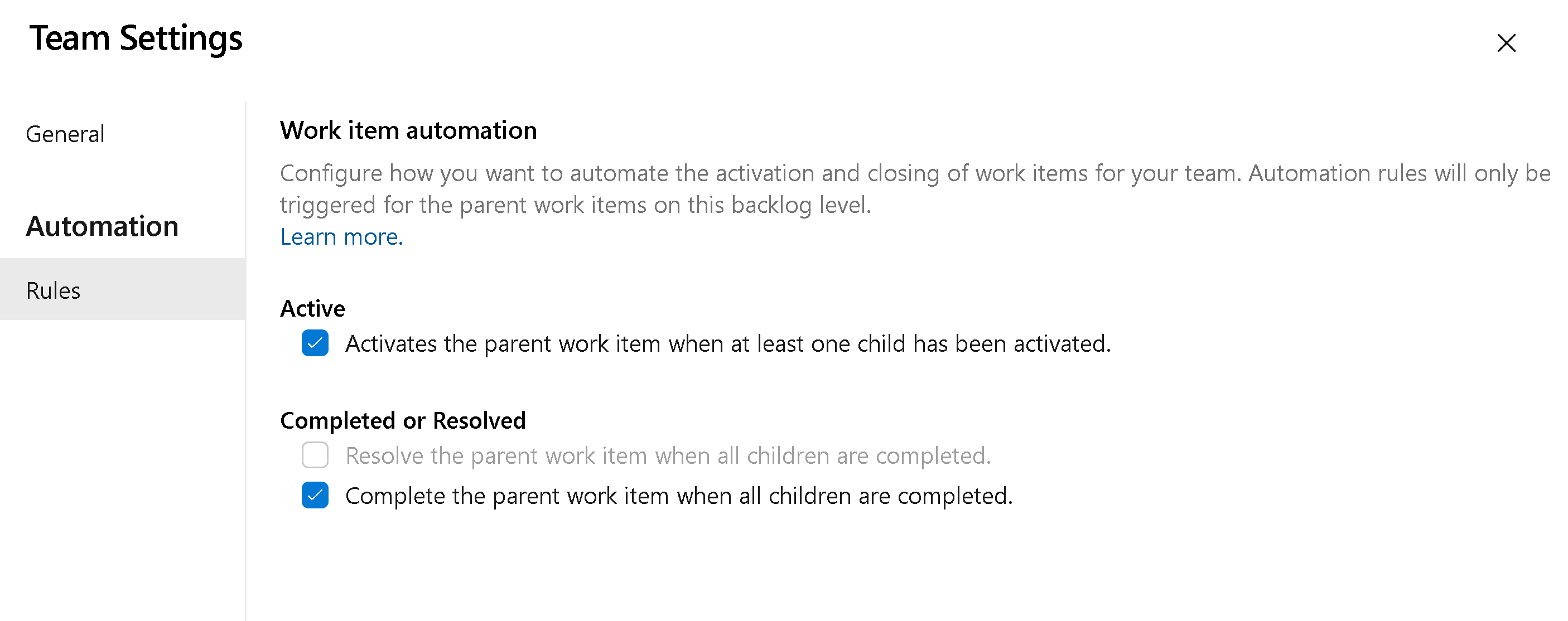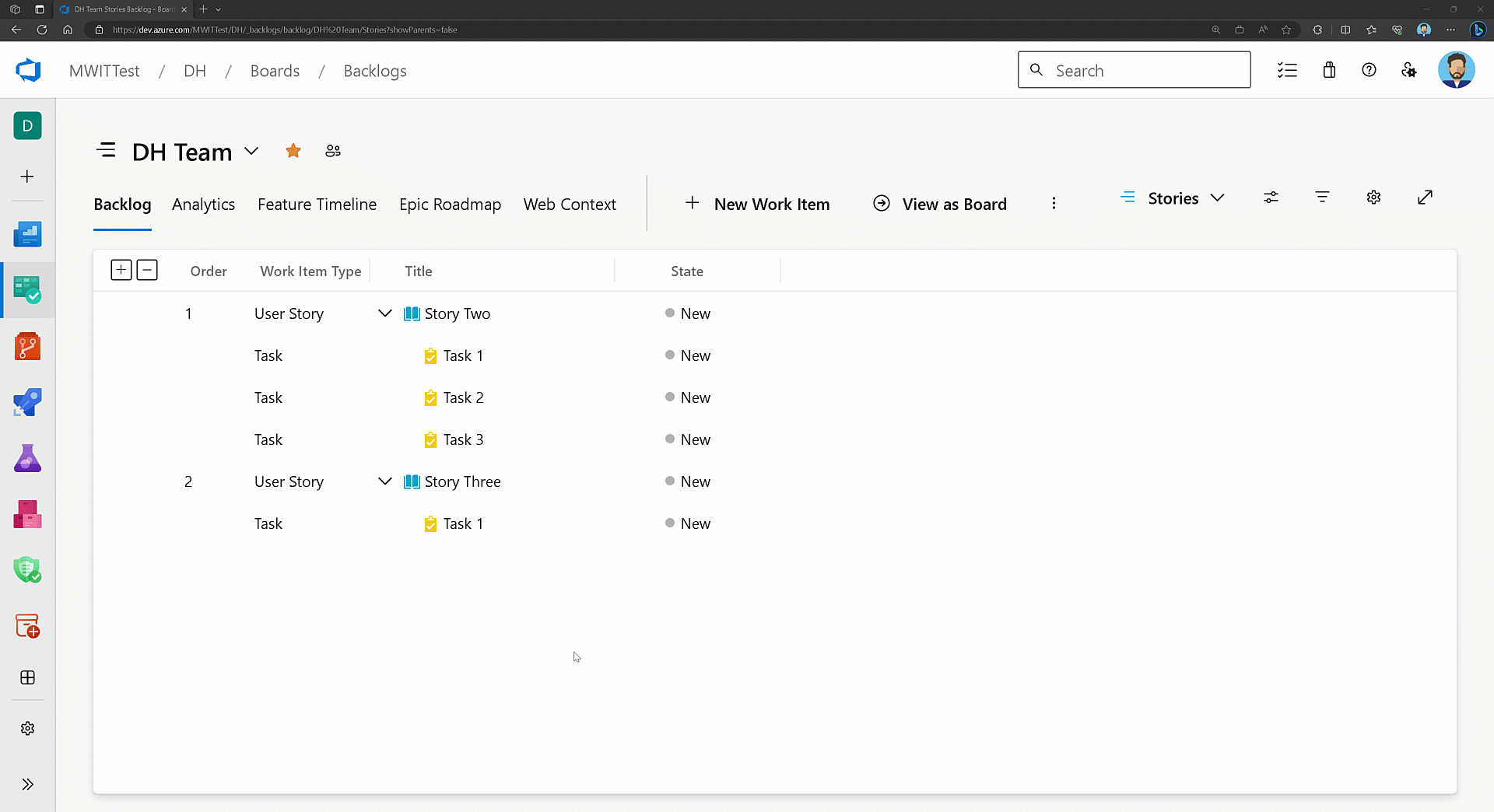团队自动化规则的正式发布和改进的 AB# 验证
我们很高兴地宣布,GitHub 和 Team Automation 规则中的 Azure Boards 应用改进的 AB# 验证已正式发布! 我们改进了 AB# 验证,以便在指向工作项的链接无效时收到通知。 在团队自动化规则中,现在可以配置每个积压工作级别,以基于子项的状态自动打开和关闭/解析工作项。
通过此更新,我们还在代码扫描中引入了对自定义 CodeQL 查询的支持! 这样,就可以创建自己的查询,这些查询专为识别特定于代码库的问题而定制。
有关详细信息,请查看发行说明。
适用于 Azure DevOps 的 GitHub Advanced Security
Azure Boards
Azure Pipelines
适用于 Azure DevOps 的 GitHub Advanced Security
Azure DevOps 的 GitHub 高级安全性中现在支持自定义 CodeQL 查询
我们很高兴地宣布推出对代码扫描中的自定义 CodeQL 查询的支持! 这使你能够创建自己的查询,这些查询专为识别特定于代码库的问题而定制。 现在,可以创建和发布包含自定义查询的包,在管道中执行这些查询,并自定义对组织相关的漏洞的检测。
有关在 GitHub Advanced Security for Azure DevOps 中使用代码扫描的自定义查询的详细信息,请参阅 用于 Azure DevOps 的 GitHub 高级安全性的代码扫描警报。
我们重视你的输入。 如果你有任何问题或反馈,我们建议你在开发者社区与社区互动。
Azure Boards
GitHub 集成 - 改进的 AB# 验证已正式发布
几个冲刺之前,我们宣布了 GitHub 中 Azure Boards 应用改进 AB# 验证的预览版。 我们增强了应用,以更好地通知用户工作项链接的有效性,帮助他们在合并拉取请求之前发现并修复任何问题。
经过数周的测试和反馈,此功能现在可供所有用户使用 GitHub + Azure Boards 集成使用。

这是我们为改进当前集成而做出的几个功能中的第一项。 请务必查看我们在公共路线图上规划的其他 Azure Boards + GitHub 集成功能 。
重要
从 2024 年 8 月 6 日开始,GitHub 中的 Azure Boards 应用将不再验证 AB# 链接。 仍可以使用语法AB#链接 GitHub 中的工作项,拉取请求、提交和问题,就像在此更改之前一样。
团队自动化规则已正式发布
我们很高兴向 Azure DevOps Service 的所有客户宣布此功能的发布。
注意
此功能将在未来两到三周内推出。 在 2024 年 2 月初之前,组织可能无法使用它。
现在可以配置每个积压工作级别,以基于子项的状态自动打开和关闭工作项(或解析)。 我们正尝试解决两个主要方案。
- 激活单个子项后,激活父项。
- 关闭所有子项后,关闭父项(或解析)。
若要启用这些设置,请单击团队的积压工作级别配置。 然后转到 “自动化 > 规则”选项卡 ,查看可应用于积压工作的两个不同的规则。 每个积压工作级别(要求、功能、史诗)都可以根据团队想要的工作方式以不同的方式进行配置。

例如,当任何子任务设置为“活动”时,使父用户情景处于活动状态。 然后,完成所有任务后,将“用户情景”设置为“已关闭”。

可以通过查看 文档 和 此博客文章了解有关此功能的详细信息。
此功能的优先级基于此开发者社区建议票证。
Azure Pipelines
在 1 月 31 日之前更新已弃用的任务
我们正在于 2024 年 1 月 31 日停用已弃用的任务。 为了帮助你识别使用这些任务的管道,我们提供了一条带有建议的替代方法的警告消息。 建议在 2024 年 1 月 31 日之前更新管道以使用较新的任务版本或替代项。

请参阅与已弃用的任务相关的早期公告:
Microsoft托管代理使用 PowerShell 7.4
所有 Microsoft托管代理 将从 1 月 28 日起开始使用 PowerShell 7.2 LTS 到 PowerShell 7.4 LTS。 请参阅 PowerShell 7.4 和 PowerShell 7.4 正式版中的新增功能。
记下重大更改并相应地更新脚本:
- PowerShell 7.3 和 7.4 LTS 之间的重大更改
- PowerShell 7.2 LTS 和 7.3 之间的重大更改
- 更新了通过
$PSNativeCommandArgumentPassing. 控制的参数分析行为。 以下示例脚本通过显式设置$PSNativeCommandArgumentPassing在 Linux、macOS 和 Windows 中强制实施相同的行为。
新的 Azure 服务连接机密将在三个月内过期
Azure DevOps 在其中创建机密的 Azure 服务连接将有 3 个月的机密到期时间,而不是两年。
若要消除轮换机密的需要, 请改为将服务连接转换为 使用 工作负荷标识联合 。 可以使用以下示例脚本将多个 Azure 服务连接快速转换为工作负荷标识联合:
#!/usr/bin/env pwsh
<#
.SYNOPSIS
Convert multiple Azure Resource Manager service connection(s) to use Workload identity federation
.LINK
https://aka.ms/azdo-rm-workload-identity-conversion
.EXAMPLE
./convert_azurerm_service_connection_to_oidc_simple.ps1 -Project <project> -OrganizationUrl https://dev.azure.com/<organization>
#>
#Requires -Version 7.3
param (
[parameter(Mandatory=$true,HelpMessage="Name of the Azure DevOps Project")]
[string]
[ValidateNotNullOrEmpty()]
$Project,
[parameter(Mandatory=$true,HelpMessage="Url of the Azure DevOps Organization")]
[uri]
[ValidateNotNullOrEmpty()]
$OrganizationUrl
)
$apiVersion = "7.1"
$PSNativeCommandArgumentPassing = "Standard"
#-----------------------------------------------------------
# Log in to Azure
$azdoResource = "499b84ac-1321-427f-aa17-267ca6975798"
az login --allow-no-subscriptions --scope ${azdoResource}/.default
$OrganizationUrl = $OrganizationUrl.ToString().Trim('/')
#-----------------------------------------------------------
# Retrieve the service connection
$getApiUrl = "${OrganizationUrl}/${Project}/_apis/serviceendpoint/endpoints?authSchemes=ServicePrincipal&type=azurerm&includeFailed=false&includeDetails=true&api-version=${apiVersion}"
az rest --resource $azdoResource -u "${getApiUrl} " -m GET --query "sort_by(value[?authorization.scheme=='ServicePrincipal' && data.creationMode=='Automatic' && !(isShared && serviceEndpointProjectReferences[0].projectReference.name!='${Project}')],&name)" -o json `
| Tee-Object -Variable rawResponse | ConvertFrom-Json | Tee-Object -Variable serviceEndpoints | Format-List | Out-String | Write-Debug
if (!$serviceEndpoints -or ($serviceEndpoints.count-eq 0)) {
Write-Warning "No convertible service connections found"
exit 1
}
foreach ($serviceEndpoint in $serviceEndpoints) {
# Prompt user to confirm conversion
$choices = @(
[System.Management.Automation.Host.ChoiceDescription]::new("&Convert", "Converting service connection '$($serviceEndpoint.name)'...")
[System.Management.Automation.Host.ChoiceDescription]::new("&Skip", "Skipping service connection '$($serviceEndpoint.name)'...")
[System.Management.Automation.Host.ChoiceDescription]::new("&Exit", "Exit script")
)
$prompt = $serviceEndpoint.isShared ? "Convert shared service connection '$($serviceEndpoint.name)'?" : "Convert service connection '$($serviceEndpoint.name)'?"
$decision = $Host.UI.PromptForChoice([string]::Empty, $prompt, $choices, $serviceEndpoint.isShared ? 1 : 0)
if ($decision -eq 0) {
Write-Host "$($choices[$decision].HelpMessage)"
} elseif ($decision -eq 1) {
Write-Host "$($PSStyle.Formatting.Warning)$($choices[$decision].HelpMessage)$($PSStyle.Reset)"
continue
} elseif ($decision -ge 2) {
Write-Host "$($PSStyle.Formatting.Warning)$($choices[$decision].HelpMessage)$($PSStyle.Reset)"
exit
}
# Prepare request body
$serviceEndpoint.authorization.scheme = "WorkloadIdentityFederation"
$serviceEndpoint.data.PSObject.Properties.Remove('revertSchemeDeadline')
$serviceEndpoint | ConvertTo-Json -Depth 4 | Write-Debug
$serviceEndpoint | ConvertTo-Json -Depth 4 -Compress | Set-Variable serviceEndpointRequest
$putApiUrl = "${OrganizationUrl}/${Project}/_apis/serviceendpoint/endpoints/$($serviceEndpoint.id)?operation=ConvertAuthenticationScheme&api-version=${apiVersion}"
# Convert service connection
az rest -u "${putApiUrl} " -m PUT -b $serviceEndpointRequest --headers content-type=application/json --resource $azdoResource -o json `
| ConvertFrom-Json | Set-Variable updatedServiceEndpoint
$updatedServiceEndpoint | ConvertTo-Json -Depth 4 | Write-Debug
if (!$updatedServiceEndpoint) {
Write-Debug "Empty response"
Write-Error "Failed to convert service connection '$($serviceEndpoint.name)'"
exit 1
}
Write-Host "Successfully converted service connection '$($serviceEndpoint.name)'"
}
后续步骤
注意
这些功能将在未来两到三周内推出。
前往 Azure DevOps 并了解一下。
如何提供反馈
我们很想听听你对这些功能的看法。 使用帮助菜单报告问题或提供建议。

你还可以在 Stack Overflow 上获得社区的建议和问题的答案。
此致
Dan Hellem